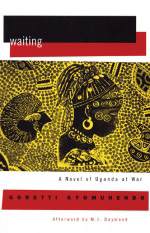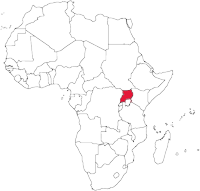

The Feminist Press, paperback, 9781558615397
 At a mere 111 pages, Waiting, by Ugandan writer Goretti Kyomuhendo, is a small gem of a novel, a portrait of an ordinary village
family during the retreat and rampage of Idi Amin's soldiers through the country in the late 1970s. We are brought into the
story during a family meal by the gentle and steady voice of thirteen year old Alinda. It is through her that we see the emotional
and physical consequences of war as the family and their friends and neighbors struggle to maintain a sense of normalcy throughout.
At a mere 111 pages, Waiting, by Ugandan writer Goretti Kyomuhendo, is a small gem of a novel, a portrait of an ordinary village
family during the retreat and rampage of Idi Amin's soldiers through the country in the late 1970s. We are brought into the
story during a family meal by the gentle and steady voice of thirteen year old Alinda. It is through her that we see the emotional
and physical consequences of war as the family and their friends and neighbors struggle to maintain a sense of normalcy throughout.
Alina is the middle child of three. She has an older brother, Tendo, and younger sister, Maya. When the story begins, her mother is pregnant, and the birth is imminent. Her father, who usually is away in the city where he works as a postal clerk, is home with the family because work has been interrupted by the war. It was safer for people to return to their villages. Living with the family is the feisty older Kaaka, the father's aunt. As the family finishes their meal, Tendo keeps watch from the mango tree and they prepare to go into the nearby banana plantation—to sleep there for the night where it is safer. They are soon joined by other family and an ethnically diverse group of neighbors, all of whom we come to know through Alinda as she tells the family's story.
There is Uncle Kembo, who converted to Islam after he lost his job in an Indian-owned sawmill when Adi Amin forced all Indians out of Uganda. Converting to Islam brought new opportunities for Kembo, but until recently, it had estranged him from his family. A neighbor, referred to as "the old man," is discovered to be a murderer who was pardoned when he converted to Islam in prison. There is also Nyinabarongo and her small daughter, who had returned to her mother's house after her husband's family had driven her away. We meet the childless "Lendu woman," whose husband is away fishing in the Congo. She is viewed with suspicion because of her knowledge of folk remedies. And we also meet Jungu, one of Alinda's school friends, who lives in a neighboring village.
Alinda is an even-tempered, likeable and dependable young teenager. She takes on many family responsibilities while her mother is less able. She has been a shy, but excellent student, although school has been suspended due to the war. Alinda is somewhat naïve at the beginning of the book, which lends a certain degree of innocence to her viewpoint, but she rapidly matures as circumstances dictate.
Kyomuhendo invites us to join this extended family as if she's discreetly left a door open, so we can quietly slip in unnoticed and slip out again five months later. The story does not shy away from the horrors of war, but does so without being overly graphic. It certainly captures realistically the constant fear the family lives with. The book ends on a hopeful note; it is as if the family and their friends are indeed "waiting", courageously moving through one day at a time, trying to keep their routines going, until a better time is reached. It is this dogged perseverance that is so moving.
Waiting has a sort of organic domestic realism, and it brings to mind other books, such as Chimamanda Ngozi Adichie's
Half of a Yellow Sun, Helen Dunmore's The Siege, and Assia Djebar's Children of the New World, all of
which present war from a woman's viewpoint. I don't think Waiting has quite the intensity of those books, but it
certainly deserves a place beside them. With Waiting, Goretti Kyumehendo gives us both a family story and a coming-of-age
novel, as well as a testament to the tenacity and resilience of the human spirit.
